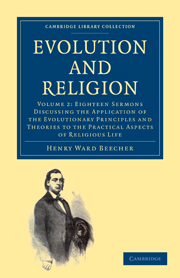Book contents
- Frontmatter
- Contents
- INTRODUCTORY: THE BACKGROUND OF MYSTERY
- I THE MANIFOLD CHRIST
- II THE CONVERSION OF FORCE
- III THE DRIFT OF THE AGES
- IV THE HIDDEN MAN
- V THE REST OF GOD
- VI GOD'S LOVING PROVIDENCE
- VII THE NEW TESTAMENT THEORY OF EVOLUTION
- VIII GOD'S GOODNESS MAN'S SALVATION
- IX POVERTY AND THE GOSPEL
- X GOD IN THE WORLD
- XI JESUS THE TRUE IDEAL
- XII THE GROWTH OF CREATION
- XIII THE BATTLE OF LIFE
- XIV THE LIBERTY OF CHRIST
- XV CONCORD, NOT UNISON
- XVI LIBERTY AND DUTY OF THE PULPIT
- XVII THE VITALITY OF GOD'S TRUTH
V - THE REST OF GOD
Published online by Cambridge University Press: 29 August 2010
- Frontmatter
- Contents
- INTRODUCTORY: THE BACKGROUND OF MYSTERY
- I THE MANIFOLD CHRIST
- II THE CONVERSION OF FORCE
- III THE DRIFT OF THE AGES
- IV THE HIDDEN MAN
- V THE REST OF GOD
- VI GOD'S LOVING PROVIDENCE
- VII THE NEW TESTAMENT THEORY OF EVOLUTION
- VIII GOD'S GOODNESS MAN'S SALVATION
- IX POVERTY AND THE GOSPEL
- X GOD IN THE WORLD
- XI JESUS THE TRUE IDEAL
- XII THE GROWTH OF CREATION
- XIII THE BATTLE OF LIFE
- XIV THE LIBERTY OF CHRIST
- XV CONCORD, NOT UNISON
- XVI LIBERTY AND DUTY OF THE PULPIT
- XVII THE VITALITY OF GOD'S TRUTH
Summary
“Return unto thy rest, O my soul, for the Lord hath dealt bountifully with thee.”
—Psalm cxvi: 37.This is a lyrical outburst, that is, it is thought fused by intense feeling. The figure is evidently that of a bird. Some storm has rocked the tree, and by its violence scared the bird away; or some stealthy animal, squirrel, cat or owl, has sought the brooding bird's life, and driven it forth; or some wandering, wanton boy, prowling, has sought the nest, plundered it, and gone on. The bird hides in the thick leaves; it watches from afar off. In silence it glides from bough to bough, keenly watching. Again and again it circuits about until it is sure of safety. Then, with joyful assurance, it settles back in its nest, and when the sun rises, it pours out its joyful song.
It is this joyful song that the Psalmist here interprets: “Return unto thy rest, for God has dealt bountifully with thee.”
It is not simply the cry of gladness, though it is glad, but of gratitude. A great joy should never be selfish, and happiness should always lead to piety. Whatever may be the intermediate instruments—natural law, friends, our own expertness and wisdom,—whatever may be the visible agencies of relief or joy, yet above all the earthly machinery by which we are succored and helped, is the Lord's will, which is the very beginning, the source from which flows the energy that moves the world through all its laws or influences.
- Type
- Chapter
- Information
- Evolution and Religion , pp. 232 - 243Publisher: Cambridge University PressPrint publication year: 2009First published in: 1885



